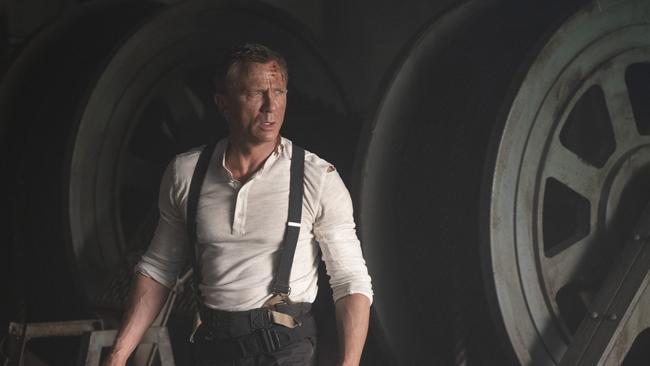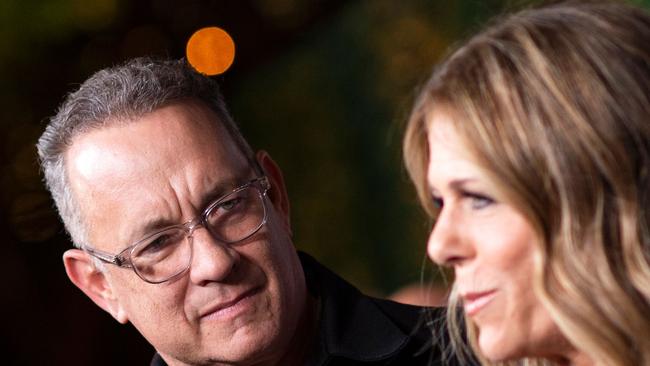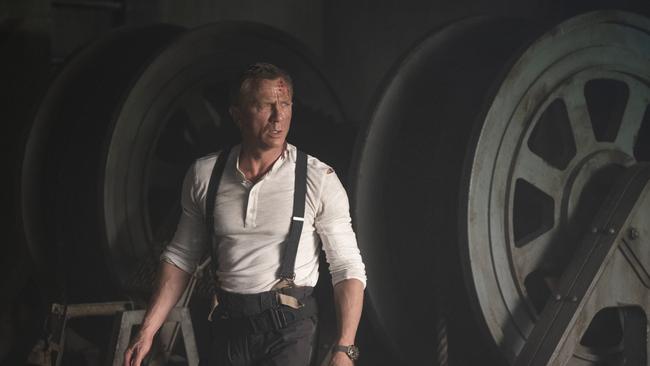Coronavirus calls cut as screens fade to black
In a fragile world where we could all use some relief, the entertainment industry is suffering.

When the impact of what was then known as coronavirus first began to be felt, audiences turned to a 2011 movie, Contagion, to experience a mixture of anxiety and reassurance.
Steven Soderbergh’s pandemic thriller was suddenly in demand, widely downloaded on iTunes earlier this year. It is a star-studded tale of infection and exploitation that offers relief: eventually, a vaccine is found.
The movie and TV industry itself is now facing a good deal of anxiety and very little reassurance. COVID-19 is having an effect on film and TV in every facet of the business: production, distribution, exhibition and consumption, on everything from Hollywood blockbusters to small local releases, as well as all the associated industries and services that rely on them.
Australia found itself in the spotlight last week when Tom Hanks announced that he and his wife, Rita Wilson, had tested positive for COVID-19 and were in hospital on the Gold Coast. Hanks was here preparing to play Colonel Tom Parker, Elvis’s manager, in Baz Luhrmann’s new Elvis biopic: the film has been put on hold as a result of the diagnosis.
This case highlighted what had already become evident: COVID-19 has dramatically affected jobs and creative endeavours and put new, unreleased movies and works in pre-production into a kind of limbo.

Decisions made in other territories have ramifications for Australia, and some developments have the potential to change the industry in the longer term.
The transformation has happened piecemeal, and is still in progress, as productions are put on hold, releases delayed, cinemas close around the world and new announcements alter the situation daily.
An early sign was the decision to delay the release date of the new Bond film, No Time to Die, which went from April to November. Since then, other high-profile releases have been postponed.
Another shift is taking place with an announcement this week from Universal. The company will make some of its new-release films available on video on demand, as well as in cinemas. This includes the animation Trolls World Tour, which had been due for release in Australia next week, as well as The Invisible Man, Emma, and The Hunt.
According to The Hollywood Reporter, selected films will be available for a 48-hour rental period at a suggested retail price of $US19.99 ($32.55) in the US. Details for Australia are still being worked out, but an announcement will be made shortly. Trolls World Tour will now release in September in Australia
This comes at a time when box-office takings in the US have hit a 20-year low. Universal’s decision could be followed by other companies, and creates the conditions for a shift that many have anticipated with considerable trepidation: the threat to the existence of the traditional theatrical window that gives films a cinema season ahead of a VOD release. Disney, in addition, has brought forward by three months Frozen 2’s release on its streaming service.
The disruption of the release calendar and the delay of the arrival of new, big-ticket films have already created problems for cinemas worldwide. Some countries have closed cinemas. So far, this has happened in more than 32 territories, with partial closures or restrictions in others.
In the US, cinemas in Los Angeles and New York have just closed, and other parts of the country are expected to follow. France went from imposing a restriction of 100 patrons before a sudden announcement last weekend led to outright closure.
In Australia, a couple of cinemas associated with other institutions have shut their doors. IMAX in Melbourne has shut as part of a decision by Museums Victoria, and the Capitol Theatre, part of the RMIT, is closing temporarily.
At this stage, Australian cinemas are taking additional health and safety precautions — such as extra cleaning, card-only transactions and seating patrons at a distance from each other — while remaining open until circumstances change.
Film festivals are considering their options. A few have cancelled or postponed and others are adopting a wait-and-see policy.

The Cannes Film Festival, in May, is a high-profile event that launches movies and careers. Additional deals are done for a wide variety of films at the accompanying market. This year’s history-making winner of the Oscar for best picture, Bong Joon-ho’s Parasite, began its run with a Palme d’Or at Cannes.
At this stage, Cannes organisers maintain that this year’s competition selections will be revealed in April, but it is surely just a matter of time until it is postponed, particularly now that President Emmanuel Macron has announced that France is closing its borders.
In the wake of festival cancellations, notably South by Southwest in the US, there have been discussions about ways to get festival selections out to audiences and buyers, now and in future.
Examples of lateral thinking can be found in other artforms. In London, the Old Vic had a West End production of Beckett’s Endgame with Daniel Radcliffe and Alan Cumming. The theatre has now closed the show before the end of its run, and asked ticketholders to consider donating the cost of the ticket, rather than asking for a refund or credit. In return, they will get a video link to a recording of the production and a video message from the cast.
COVID-19 and the measures to combat its spread have already had a devastating impact on the arts and entertainment industry, where so many participants work from project to project and job security is fragile and conditional.
As Screen Producers Association chief executive Matthew Deaner pointed out earlier in the week, the screen industry in Australia is facing “massive disruption”. Film and TV involves not only those directly working on projects, but also communities providing services for them.
“Productions employ thousands in teams,” he said. “Actors and crews need to be with each other to work. There is no remote opportunity for employment on physical production.”
Deaner said assistance would be necessary: “While businesses are undertaking continuity planning and efforts are being made to minimise the impact, support will be needed to minimise bankruptcies and job losses.”
Among large-scale projects, Luhrmann’s Elvis biopic is already on hold and production has stalled on a Marvel feature, Shang-Chi And The Legend Of The Ten Rings, shooting at Fox Studios, where Taika Waititi’s new feature, Thor: Love And Thunder, was also scheduled to shoot.
Many other works in pre-production will be stalled or interrupted. Even when work is able to resume, there will be a big production gap that cannot be easily remedied or filled.
In the meantime, audiences staying at home have streaming services to turn to, such as Netflix, Stan, Amazon Prime, Foxtel Now, Disney+, Apple TV+, ABC iView and SBS on Demand. Other options include Mubi Australia, a curated service offering a monthly menu of classic and indie movies, and Kanopy, a free service linked to library membership, which allows five streams a month.
Film-related podcasts will come into their own, and smaller-scale live-streaming events — such as Lockdown, organised by Sydney outfit Static Vision — have potential as well.
Some filmmakers are tackling COVID-19 by putting their energies into public service announcements with a personal touch. Comedy legend Mel Brooks, 93, and his son Max have made a PSA urging people to practise social distancing. And Arnold Schwarzenegger made a video in his kitchen with two of his favourite pets. Rather than telling us “I’ll be back”, he says he will be staying home, feeding carrots to donkey Lulu and pony Whisky, and recommends others doing likewise.

To join the conversation, please log in. Don't have an account? Register
Join the conversation, you are commenting as Logout